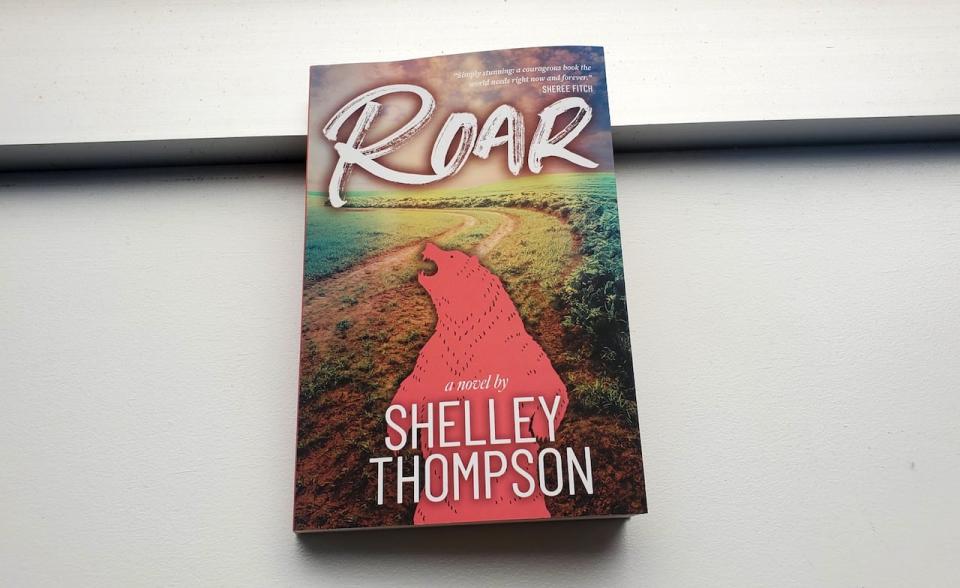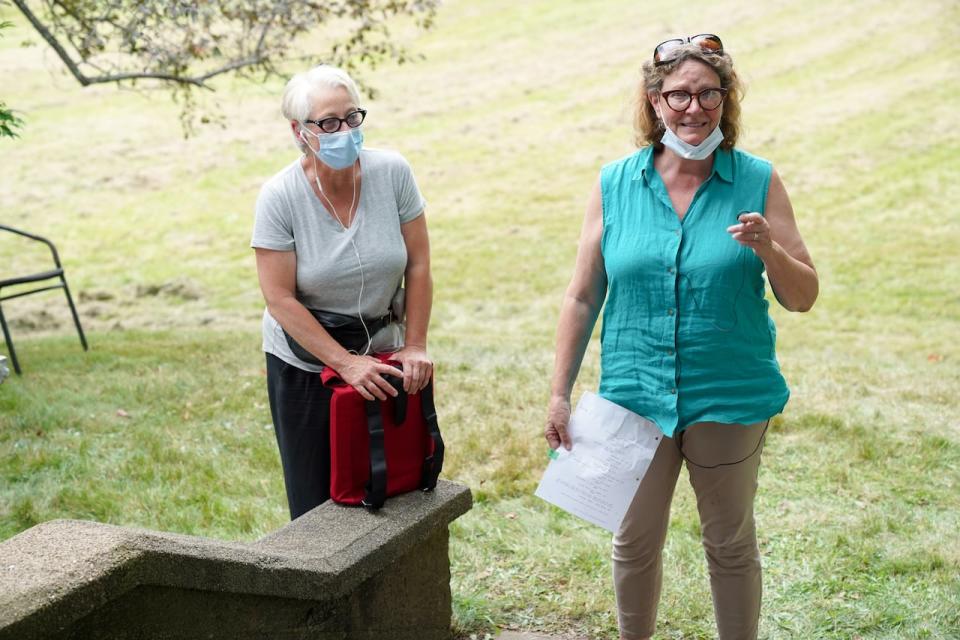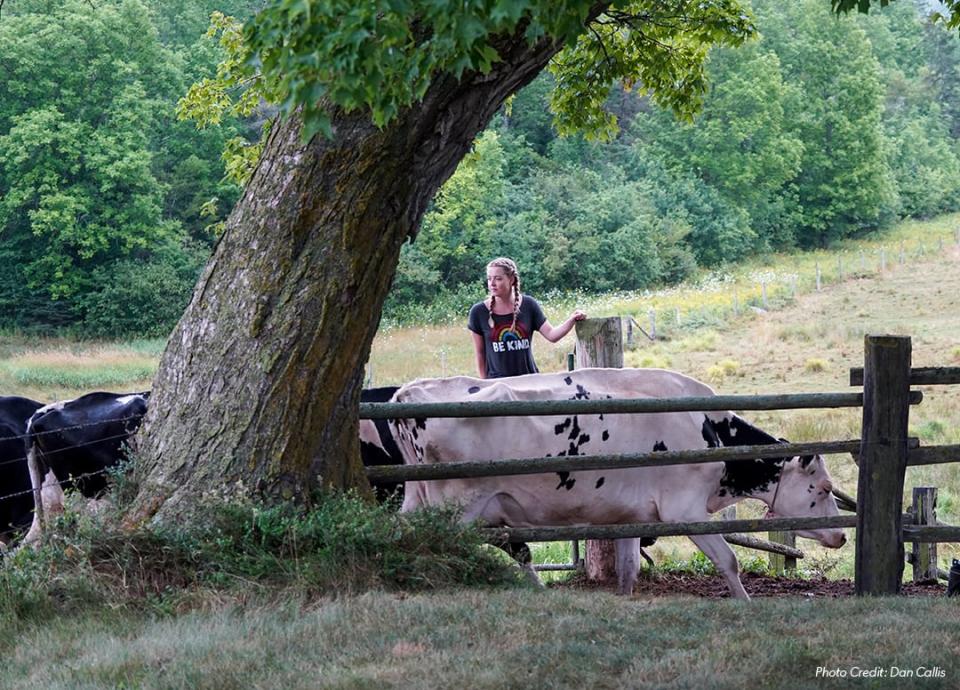Why a Nova Scotia author hired sensitivity readers for her debut novel about a trans woman

A Nova Scotia author who has adapted her film about a young transgender woman finding acceptance in her rural hometown says using sensitivity readers opened her eyes to a better version of the story.
Shelley Thompson used three sensitivity readers during the editing process of her novel, Roar, which is based on the screenplay of her 2021 film Dawn, Her Dad and The Tractor.
Sensitivity readers are specialized editors who look through authors' work for potentially offensive material or stereotypes.
The book follows Dawn, who returns to her rural Nova Scotia home after the death of her mother, with the hope of mending her relationship with her estranged father.
Thompson wrote the film, and now novel, by drawing on her son's experience of being transgender, but also included her own perspective as the parent of a transgender child.
"I'm not a trans person and I can't speak for trans individuals," Thompson told CBC Radio's Mainstreet Halifax. "There's so many elements of the trans journey I can't even imagine — and I have a good imagination — but I can't."

Roar by Shelley Thompson was released by Nimbus Publishing on Oct. 31. (Cassidy Chisholm/CBC)
Thompson said she hired sensitivity readers to ensure she captured the realistic experience of being trans, beyond her own parental perspective.
Veronica Merryfield, who runs the Cape Breton Transgender Network, was one of the sensitivity readers for the book.
She said it's critical for authors to employ sensitivity readers if they're telling a story about another community's experience.
"It was an interesting process for me to just sit and read a book with the notion of I am looking for issues here for potential readers in the future, to help Shelley create that story," Merryfield told Mainstreet.
"And I came away at the end of it just blown away with the way that Shelley had captured in the nuance of what I knew she had experienced and some of what she hadn't experienced."
Merryfield is a trans woman, and has been a support person for trans children, their families and trans adults for about 30 years.
She said this is the first time she has been asked to be a sensitivity reader. She said she focused on the development of the characters, and the nuance of the trans journey.
"It's worth stating [that] for trans people, the journey they take is often a very solitary one until the point that they come out," she said.
"And at the point they come out and tell others, it becomes a bit of a shock for others, but it's not a shock for them because they've been dealing with it for so long."
Working with sensitivity readers
Thompson said there has been some resistance about using sensitivity readers in the industry because some authors think it limits what they can write about.
But she thought it was necessary for this story, comparing it to hiring an expert if you were writing a book from the perspective of a police officer or doctor.
"If you don't get the right information, you just look foolish," she said.
"And it's not about how you look, but you're also putting out wrong information and basing stories on wrong information and I think that's not good."
After the sensitivity readers went through the manuscript, Thompson said they had discussions about certain characters and scenes to decide if they needed to be altered to better reflect real-life experiences.

Producer Terry Greenlaw and director Shelley Thompson are shown on the set of Dawn, Her Dad and the Tractor during filming in Nova Scotia. (Dan Callis)
"What I found so extraordinary was none of the notes that I got were no-go areas," she said.
"And the slight changes that I had to make, what I found about a sensitivity reader was it opened my eyes to certain things, but it made me be creative to offer a better version of a thought that we could both agree on."
One example of this was a scene where Dawn's father, John Andrew, meets a friend of his daughter's who is a tall, transgender Black woman.
"John Andrew is looking at a person the same height of himself, which is very rare for him to encounter a woman of that height, and so he has to go, 'Whoa, I'm looking at a woman, a beautiful Black woman, whose hands are as big as mine, who's as tall as me, and I have to adjust my thinking to allow the space for that individual to bring all those attributes to the table," Thompson said.
Merryfield said she has concerns about that scene because there are certain binary assumptions around height.
"If you're of a certain height, you must be male. If you're below a certain height, you must be female, and that happens a lot around the misgendering of trans individuals," she said.

Thompson said the film and book are based on her son's experience of being transgender and her own perspective of being the parent of a trans child. (Dawn, her Dad & the Tractor/New Dawn Films)
Thompson said that scene is told from John Andrew's perspective, so his reaction is meant to reflect someone who is still learning.
She said working with sensitivity readers has taught her to be a better ally, and she hopes the book will encourage others to learn more about the trans experience.
"We're losing a whole generation of kids — potentially a whole generation of potential intelligence, capability, skills, talent — by shutting them down," Thompson said.
"We're losing people all around the world in many different ways, but we don't need to lose them in Canada. We don't need to lose them in the [United] States by saying we don't need you, you're invisible. We don't need to do that.
"So I want to be part of the groundswell that helps make sure those kids are safe to fulfil who they are."
Roar was released by Nimbus Publishing on Oct. 31.
MORE TOP STORIES


